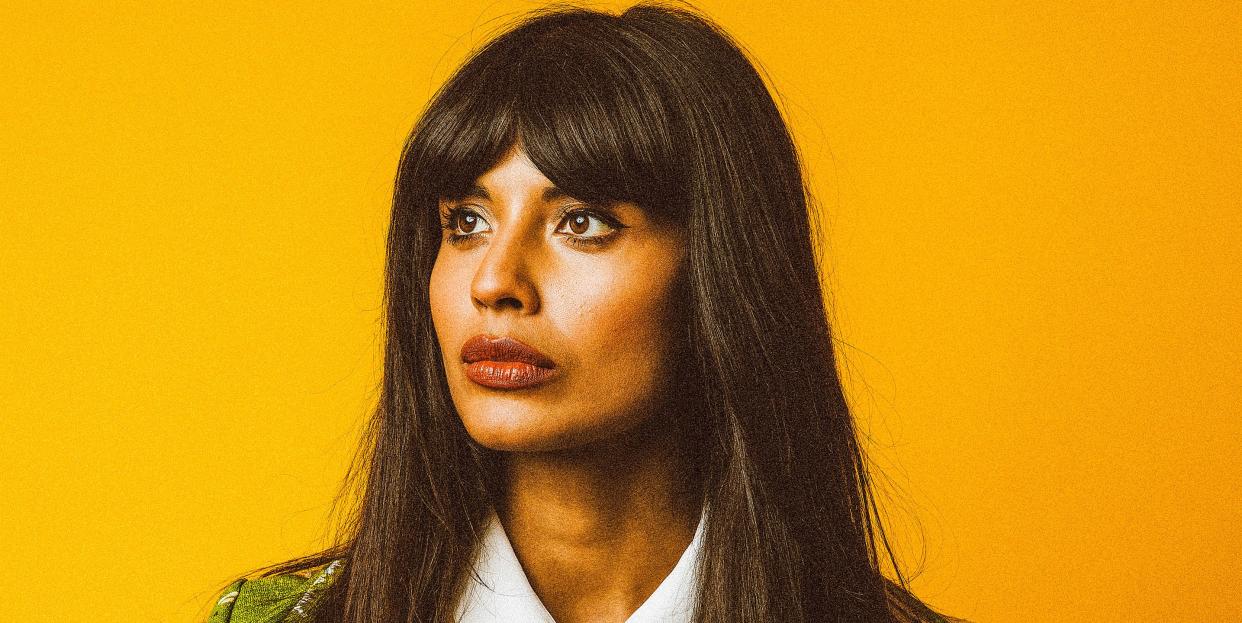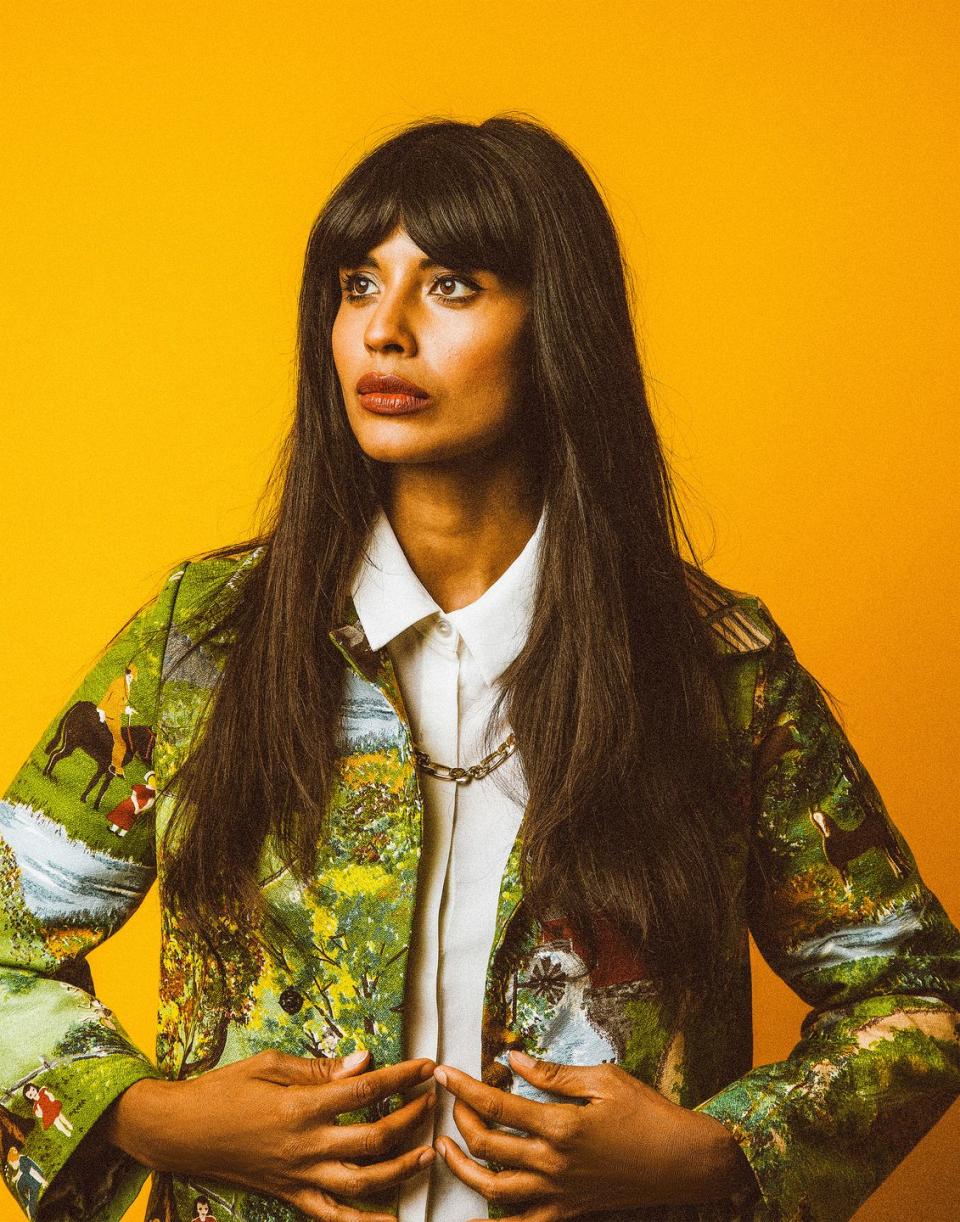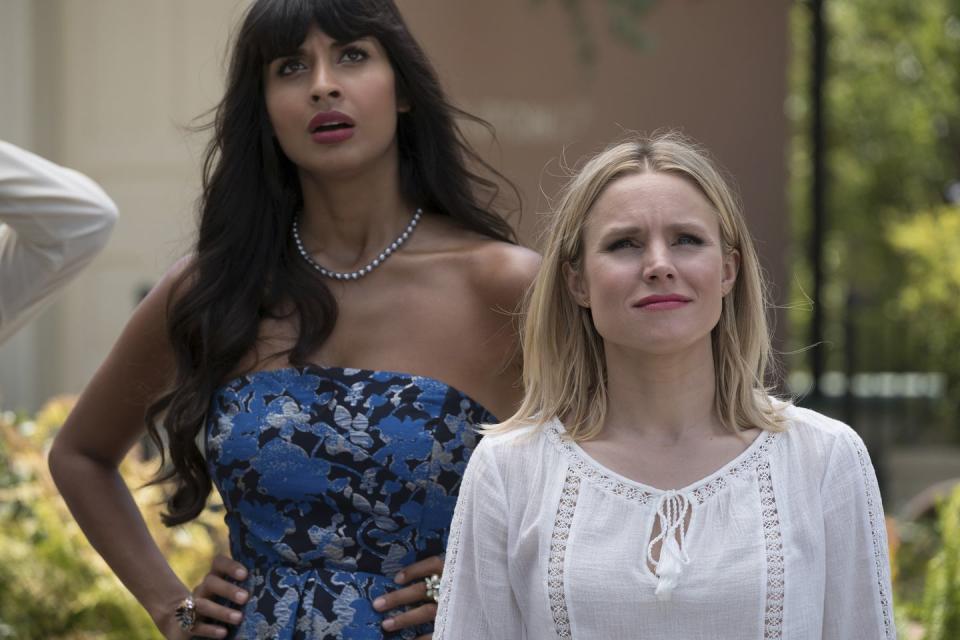Jameela Jamil on 'The Good Place,' Her New Documentary, and Her 'Burger-Friendly, Life-Positive' Mission

Here's a partial list of the items I consumed while on a picnic with Jameela Jamil: egg salad, chicken salad, French bread, bacon, fruit salad, frittata, baked apples, and rice pudding with mango puree. The picnic was her suggestion, and she’d planned to do all the shopping, until it occurred to her that choosing someone else’s food might be “a dick move.” (I was excited about the prospect, personally.) We had arranged to meet outside Los Angeles’s Erewhon Market, but when I arrive, clutching a couple of furry pillows and a blanket, she texts me to come find her inside- she’ll be the one in the cheeseburger sweater.
Obviously, even if she weren’t wearing a garment featuring a flap of felt cheese under a bun, Jamil, 32, would be hard to miss. For one thing, she’s 5'10" in flats-and approximately seven feet tall in black platform booties and cut-offs. For another, she stars as philanthropist-socialite Tahani Al-Jamil on the hit NBC series The Good Place, Michael Schur’s hilarious existential comedy about the afterlife, a kind of sitcom spin on Sartre’s No Exit. She claims-in her self-deprecating English way-to be “an uncouth, disgusting, and disappointing person” in real life, but the distance between this statement and reality produces some cognitive dissonance. In person she is, in fact, disconcertingly lovely. She’s also an outspoken advocate for dismantling impossible beauty standards, so I feel bad mentioning it, but her beauty does kind of jump out at you. I mean, people stare.
As it turns out, it’s not the easiest thing in the world to have a picnic in the middle of L.A. on a Saturday morning, but the effort (long hike, wrong shoes) proves worth it when we reach Pan Pacific Park, with its dogs and kids and groups doing Zumba. Jamil loves it here. She appreciates how unselfconscious everybody is (except for the dude blasting music from his bike-he could stand to be a little more self-conscious). Here’s what she doesn’t love: bugs. Jamil recoils from anything that flies and was even hit by a car while trying to escape bees. Twice. Her proneness to accidents is epic, and her costar Ted Danson confirms this: “You don’t want to stand too close to her, because she’ll throw you under a bus to get away from a bee.”
The first time Jamil was hit by a car, she was 17. The accident damaged her spine, and she wasn’t sure if she’d walk again. She ended up spending a lot of time watching sitcoms in bed (Danson’s Cheers was a favorite). Upon recovering, she met a man at a pub who suggested she audition for a TV-hosting gig. She went expecting nothing but wound up being offered a role on a show called Music Zone. She held on to her day job teaching English to foreign students until her growing fame became a distraction. “It was a very weird time for everyone involved,” she says.

Years later, while Jamil was working as a DJ for BBC Radio 1, her asthma got so bad that she was prescribed steroids. “Steroids make you eat trees and planes and cars,” she says. “Anything you can find-you’re never not hungry, and I was on them for months and months and months.” She gained 75 pounds and “got roasted by the media, absolutely roasted,” she says. “There were paparazzi outside my house. Bear in mind, I’m a radio DJ.” Some suggested she sign a deal with a weight-loss company. Instead, she went to the House of Commons. “I spoke about the wording and the messaging in our tabloids, the way we treat women, and what that did to me as a child,” she says. Her activism led to a collaboration with the clothing brand Simply Be on a “burger-friendly” namesake collection. Then, after seeing an image of the Kardashians and Jenners that included each woman’s weight, Jamil started a movement on social media called “I Weigh.” “This is how women are taught to value themselves. In Kg. Grim,” she wrote in her Instagram Stories. She posted a selfie and listed what she gives weight to, things like “great friends” and “loving my job,” adding, “I like myself in spite of EVERYTHING I’ve been taught by the media to hate myself about.”
For the most part, Jamil grew up in London, with shorter stints in Pakistan and Spain. Her Indian father and Pakistani mother had “a very sad marriage,” Jamil says. “I had quite a lonesome childhood, and it’s taken me a long time to learn how to be around other people.” She attended a private girls’ school on scholarship and didn’t have a good time there, either. “I was a weird kid, to be fair,” she says. “I was deaf for a large portion of my childhood, so I used to have to stare at people to lip-read, and even when I got my hearing back [via surgery], I would still stare naturally. I was stare-y. And I am overly honest, always have been.”
From age 14 to 17, Jamil had an eating disorder. “I didn’t eat a meal for three years, and my period stopped,” she says. “Where did my teens go? Who took that from me? It was a lack of good messaging from women,” she says. “You had Kate Moss saying, ‘Nothing tastes as good as skinny feels.’ Or a woman would gain weight for a movie and then lose it for the Oscars, and everyone would be like, ‘Oh, thank God Renée [Zellweger] is back from her disgusting size eight in Bridget Jones’s Diary.’ Clap, clap, clap. ‘Congratulations, Renée!’ And because no one was ever criticizing or questioning it, I was like, ‘Oh, that’s the right way to think.’ Those were my role models.”
Jamil is on a mission to change this outdated mind-set, and one way she’s doing so is by refusing to be airbrushed. “I’m just trying to be okay with myself,” she says. “I think it’s insane if you’re okay with being airbrushed. We’ve been conned into thinking it’s a good thing to be made to look better than we actually do. It’s a direct insult: ‘You don’t look good enough as you are, so we’re gonna fix you.’ ”
She also takes issue with the expectation that women fit a homogeneous mold of perfection. “The patriarchy profits from conditioning women to only think about our exterior, to spend all our money and time obsessing over our aesthetic rather than building what’s inside,” Jamil says. “We allow ourselves to be abused by family, friends, strangers online, ourselves.” Society finds a wide variety of men attractive, “from Mark Ruffalo with his dad bod, to Adrien Brody to Leonardo DiCaprio to James Franco,” Jamil says. But then, with women, “it’s like we all have to look like this sex-doll, teenage version of Angelina Jolie, and everyone’s getting the same shit done to like that, and wearing enough makeup to look like a member of the Addams family. It looks great on a filtered picture on Instagram, but it looks insane in real life.” I nod and chew as she picks up steam, culminating in an assessment of the Kardashians as “unwitting double agents for the patriarchy.”
Jamil was famous-hounded-by-tabloids famous- in England for several years. She couldn’t travel and felt stunted. So when she had a breast cancer scare a few years ago, it prompted her to make some changes. She quit her BBC radio job, dumped her boyfriend, and moved to Los Angeles. People told her she was too old, too fat, and too ethnic to make it in Hollywood, but she knew it was time to move on. Besides, she was still a few years shy of 30.

She wanted to be a writer but had no contacts. She stayed at a terrible hotel and spent her days at a nearby restaurant. At one point, she met a Serbian lingerie model in need of a roommate. The woman helped her get her bearings and open a bank account. Her new flame, English singer-songwriter James Blake, whom she’d only known for four weeks at the time, flew out to visit and never left. Eventually, she found herself in a conference room with Hollywood power brokers insisting that she try out for The Good Place. The show was basically a state secret, and all Jamil knew ahead of the audition was that Schur wanted someone of her ethnicity but also English and irritating. “I believe I definitely check all three of those boxes,” she says with a laugh. Even so, she had low expectations, assuming he would find her to be “a shit actress,” but possibly likable enough to hire as a writer. When Schur met Jamil, he couldn’t believe she wasn’t already a star. “Her presence was undeniable, and her audition was sort of stunning,” he says. “The character was described as having a British accent, and she asked me before she read which specific accent I’d prefer-Oxford, royal family, East London, West London, and so on-and demonstrated each of them with flawless precision. The idea that she had never acted before seemed impossible.”
At this point, Jamil has undoubtedly hit her stride. The third season of The Good Place, she assures me, is the funniest ever. She also recently completed The New Age of Consent, a two-part documentary for the BBC, and she has a few more big- and small-screen surprise up her sleeve. But the first season of The Good Place, she admits, was hard for her to fully enjoy. “It was a very fun, very tense experience, but I was so scared,” she says. “We shot the finale last, so you literally walked away with a feeling of ending. I’d been quite numb throughout filming, so at the end, I thanked everyone and was just very cool and collected about everything that had happened for the last five months-bizarrely so, considering I was on the Universal film set, where they filmed Spartacus and Jurassic Park. And then, as I started walking off the set, I began sobbing uncontrollably, all the way to the gate, and it’s, like, a 20-minute journey in a golf cart.” Then she connects all the dots. “When I was 17, I had that car accident that hurt my back. Kids my age were at university, and my father had just left. I didn’t really have anyone to talk to, and literally every minute that I was awake, I was watching American sitcoms. And to know that that kid-who thought that she would never walk again, who felt so despondent-was now in an actual, real-life American sitcom, with Ted Danson, whom I used to bloody watch on Cheers, it just hit me like a ton of bricks.”
Jamil reaches for a container of rice pudding and digs in. We’ve returned to the subject of body positivity, which she says has been co-opted by corporations and is now being used as an excuse for women to continue to talk obsessively about their bodies. “It’s not that there’s anything wrong with it,” she says. “I just want more of a narrative that has nothing to do with our bodies.” Thus the impetus behind “I Weigh.” “It’s not a body-positive movement,” she says. “It’s a life-positive movement.”
Some progress has been made, Jamil acknowledges, “but there are still attempts to drag us back down. Being okay with yourself is the most amazing middle finger to everyone.” She’s quick to clarify, though, that caring about your looks is okay, too. “I wear a bit of makeup and short shorts and high platform boots sometimes,” she says. “But it’s an eighth of who I am. I’m not sitting here as an actress who sometimes endorses clothing lines being like, ‘Don’t care at all about the way you look.’ Just don’t make it everything. It’s a piece of the pie-not the whole fucking pie. Men are told to become so successful and smart that they get to date a Victoria’s Secret model. We’re told to become smart and successful and look like a Victoria’s Secret model. What is this bullshit extra homework?”
The older she gets, the more aware Jamil becomes of the way shaming works to keep women from stepping into their power. “I’ve realized that of all the things I wanted, most of them were available to me all along. I was just made to believe they weren’t.” Her book project, currently untitled, is a compendium of everything she wasn’t told. “I was not given the information that I needed as a young person to survive this tumultuous life, and all I want is to be the voice that I didn’t have, in the hopes that I might reach some people and remind them that we are exceptional, rounded creatures,” she says. The Time’s Up movement showed her how women working together “can get shit done,” and fast. “We just need to keep fighting,” she says. “More of us need to say, ‘You know what? I’m gonna love myself.’ We need to put scientists on the covers of more magazines-more variety, like there is for men. There needs to be less breaking women and selling to women, and more nourishing them. And then we’ll be great. We’ll be equal.”
This article originally appeared in the October 2018 issue of ELLE.
('You Might Also Like',)

